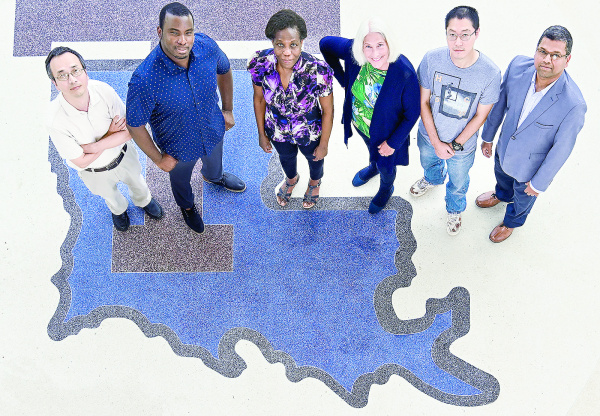Tech partners with others through $ 6 million NSF award

This Louisiana Tech research team will partner with others throughout the country to develop printable sensors to measure toxic chemicals in surface and drinking water for widespread environmental surveillance. The interdisciplinary team, which includes Prabhu Arumugam, Christobel Asiedu, Nono Gueye, Xiyuan Liu, Terri Murray, and Shengnian Wang, is also investigating the technology’s societal impact. Photo courtesy of Louisiana Tech Communications
The National Science Foundation awarded $6 million to Louisiana Tech University and partner universities to create printable sensors that detect heavy metals and pesticides.
The research proposal to the NSF Established Program to Stimulate Competitive Research ( EPSCoR) Research Infrastructure Improvement is titled, “ Facilitating Ubiquitous Technology Utilizing Resilient Eco- friendly Sensors ( FUTURE Sensors)),” with Louisiana Tech faculty Terri Murray, Associate Professor in Biomedical Engineering as the principal investigator.
Louisiana Tech University will serve as the lead institution for the project. Partner institutions in this research are Boise State University, Louisiana State University Shreveport, University of Alabama at Birmingham, University of Arkansas for Medical Sciences, and University of Arkansas at Pine Bluff.
Participants will produce databases of eco-friendly, printable sensor inks for microelectronic devices and functionalized carbon dots for detection of toxic chemicals, and the project will advance chemical and materials engineering, sensor design, environmental research and human safety.
“ We are excited to receive funding from the National Science Foundation to develop FUTURE Sensors,” said Murray. “These novel devices will transform the way we detect environmental pollutants in people and in our rivers and lakes.”
The project’s research aim is to develop printable sensors to measure toxic chemicals in surface and drinking water for widespread environmental surveillance.
These sensors will also measure levels of environmentally- produced toxins in human populations at risk and for individual use. Prabhu Arumugam will lead a team to design and test sensors in partnership with Harish Subbaraman of Boise State. Shuk Mei Ho of the University of Arkansas for Medical Sciences and Ross Nazari of the University of Alabama at Birmingham will use the sensors for testing in humans and polluted water. All four faculty are Co-Principal Investigators for the funded project.
The project will also encourage training and mentoring programs for students, post-doctoral scholars, and early career faculty in the program. The overall goal is to recruit, train and retain a diverse workforce.
Christobel Asiedu, Associate Professor in Sociology, will provide insights on the technology’s societal impact while serving on the project’s leadership team. Asiedu said the project will benefit vulnerable communities, who are disproportionately exposed to toxic chemicals as well as broaden the participation of underrepresented groups into STEM fields.
“My role will focus on making sure that the project teams are addressing diversity, equity and inclusion (DEI) goals by ensuring that we recruit women and underrepresented groups into our research, training and program activities,” Asiedu said. “With other members of the team, I will conduct training sessions for team leaders to ensure that DEI goals are fully integrated into the project.”
The other members of the Louisiana Tech University are Shengnian Wang, Nono Gueye, and Xiyuan Liu. The six researchers on the Louisiana Tech team represent five disciplines within the College of Engineering and Science, School of History and Social Science and Department of Economics & Finance.
Once the research project is complete, sensors will be commercialized through industrial partners as well as other technology transfer organizations. The global commercial markets for these sensors include environmental chemical surveillance, municipal and homeowner water supply monitoring, and community groups.
“Their future commercialization will provide multiple benefits which include the creation of high- paid STEM jobs, sensor sales revenues, and cost savings for environmental monitoring in our communities,” Murray said. “This project will also support recruitment and training of a diverse workforce that will be ready to fill the jobs created by this new branch of sensor technology.”

